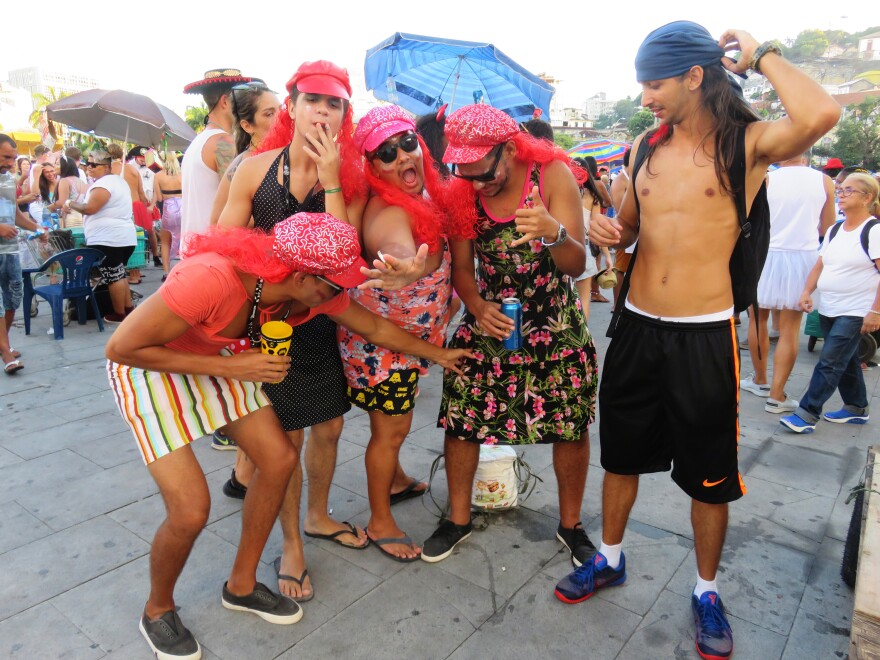You can buy a remarkable number of items on Copacabana Beach just by sitting on the sand a few yards from the Atlantic waves, and waiting.
Without leaving your beach chair, you can purchase a piece of cheese, a kiddie pool, a blanket, a skewer of shrimp, a string bikini, a selfie-stick, a tropical shirt, a pineapple or a coconut.
Be under no illusions: Copacabana is not merely a beach. It's a giant, restless market, staffed by vendors who drift around in steaming heat, flourishing their wares at the multitude of near-naked basking bodies.
That's why I went there this week. I needed something. The stores in Rio de Janeiro were mostly closed because it was a holiday. Copacabana seemed to offer a solution.
What I needed was a pair of rabbit ears. I might have settled for a plastic Roman gladiator helmet, a pink tutu or some devil horns. But ears seemed the cheaper and more palatable option.
Why the need? Because in Rio — a city where so many so often wear so little — I have felt underdressed over the last few days.
You would, too, if you lived in a place whose population appears suddenly transformed into a medieval court who's busted out of the royal palace to wander the streets randomly with its menagerie.
Step out of your front door during Carnival at any hour of day or night, and you'll soon run into a king, a jester, a leopard or a princess, usually glugging beer from a can.
If you're not wearing anything festive of your own — a twist of tinsel, at the very least — you're not entering into the spirit of the occasion.
I sat on Copacabana Beach for an hour and a half. Cheese came and went. A man wandered by, selling party masks decorated with lurid feathers. I bought one for $10, but didn't like it, so held out for ears.
Bad decision. On Copacabana, there were no rabbit ears on sale. At any rate, I couldn't find any.

Eventually I spotted a white fluffy pair perched on the head of a woman selling tapioca at a stall on the street nearby. Asking her to lend me her ears seemed ... too theatrical. I offered to purchase them. She was happy with the 8 bucks I gave her, and threw in her bunny tail for free.
Second-hand ears equipped me satisfactorily for the day's NPR assignment: to visit some of the hundreds of boisterous street parties, known as blocos, underway in Rio de Janeiro this week. Carnival officially runs for five days, ending on Wednesday. But the blocosbegan two weeks ago and will carry on through this weekend.
Covering Rio's Carnival presents a peculiar challenge to foreign journalists. You can write about the worrying amount of crime: Videos appeared on TV this week showing gangs of youths robbing and beating people on the beach. The cops rounded up more than 100 people in costume Tuesday, suspecting them to be thieves, although only a handful of them wound up being charged.
Those TV images underscored the general crisis in security in Rio that on Friday prompted Brazil's President Michel Temer to sign a decree ordering the army to take control of the state-run police forces, in the first such move since Brazil's dictatorship ended in 1985. (The decree requires approval by Congress.)
You can write about the security operation — the 17,000 law enforcement officers who were supposed to protect Rio's estimated 6 million revelers — or the mountain of trash collected during the festivities, some 600 tons, according to municipal authorities. Or the fierce tropical storm, that suddenly hit the city mid-week, causing floods and four deaths.
Political satire is an especially compelling angle. This year, Rio's Mayor Marcelo Crivella, an evangelical bishop, slashed subsidies for Carnival. Instead of attending the lavish, revenue-generating parades by his city's competing samba schools, he took off for Europe. One school responded by adorning a float with a large bare butt, bearing Crivella's name (though this was reportedly kept covered during the parade).
This year's trophy was won by a school, Beija-Flor, whose dazzling performance was a howl of protest and pain about Brazil's political corruption, violence and intolerance. One of its floats featured a giant smirking rat and politicians brandishing briefcases stuffed with swag.
You can always write about that.
But, trust me, throughout all this, one question will get jammed in your head, and won't go away.
Why?
Why do all these people do this? Partying en masse for so long? What mysterious forces drive this bacchanalia?

I have been asking Brazilians this question for days. One phrase keeps cropping up in conversation. " Soltar a franga" — "release the inner chicken."
You probably already know this chicken. It's the inner chicken that encourages you to moon-walk on the dance floor at a family wedding party when you don't know how. Thatchicken.
Brazil celebrates New Year in the same way as almost everywhere else, yet its Carnival is widely seen as the real end of the year, and the start of the next. For many here, last year was particularly rough, thanks to a stubborn recession, a massive corruption scandal and a sharp surge in deadly violence.
Releasing that inner chicken is, it seems, a way of purging the anxiety and tension amassed over months.
Plenty of chickens were certainly on the loose this week in Botafogo, a beachside neighborhood of southern Rio overlooked by Sugarloaf Mountain and the Christ the Redeemer statue.
Thousands of decorously clad people bopped, bellowed and boozed along to the music at a bloco called " Bicho Solto Com Desculpa Pra Beber" ("The Footloose Lad With An Excuse To Drink").
Watching approvingly from the sidelines I found Carlos Eduardo Vieira, 58, who was born and raised in Rio. He has strong views about the importance of liberating chickens.
Letting out your inner chicken is "fundamental for survival and happiness," says Vieira.

"Everyone must release their inner chicken," he explained, "There are people who go through life until they are 80 or 90 years old, desperate to let out their chicken. They die without doing so, which is a mistake ... you should go through life, and let the inner chicken out as many times as is necessary."
Hear that? Fundamental for your survival.
As many times as necessary.
That's good enough for me: I'm keeping my fluffy rabbit ears for next year.
Copyright 2020 NPR. To see more, visit https://www.npr.org.



